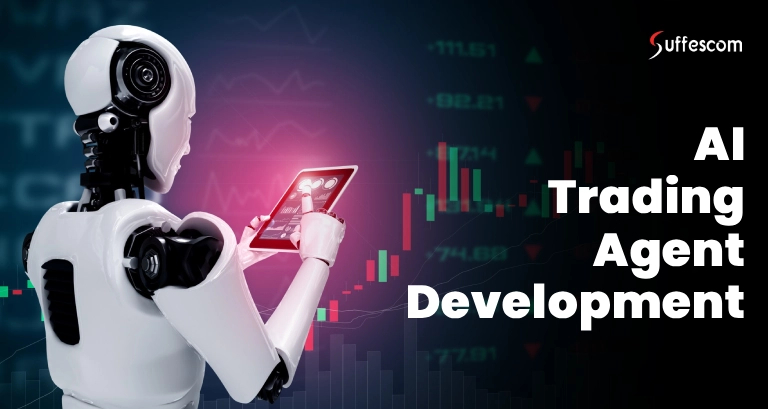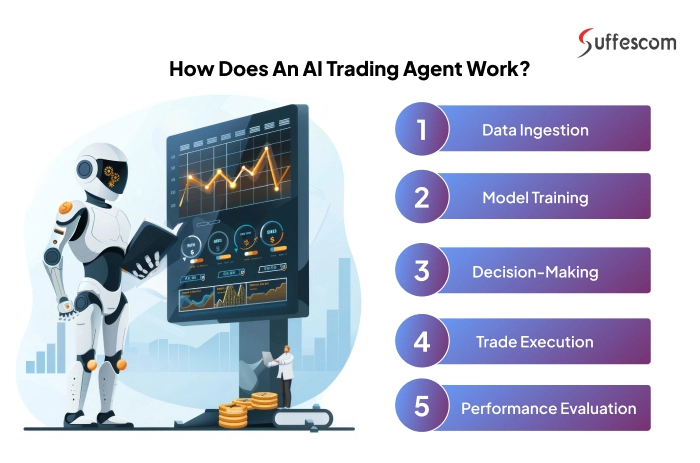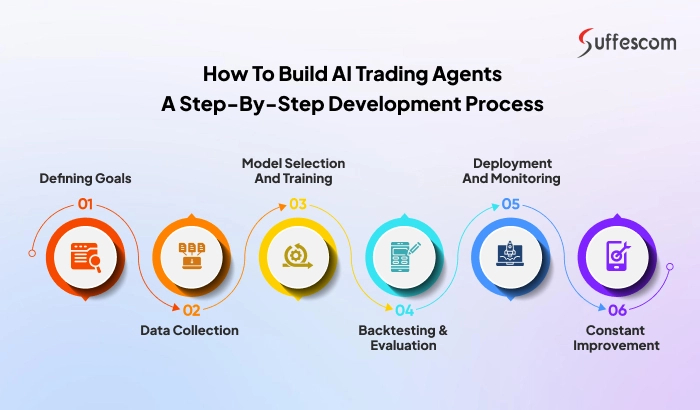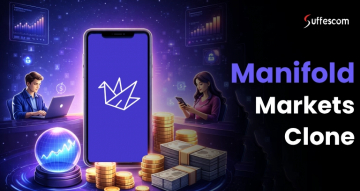AI Trading Agent Development: From Strategy to Deployment

Build an AI trading agent with clear trading objectives, AI model training, integration with robust trading platforms and deployment on the trading environment.
Trading today isn’t about instinct. It’s about speed, precision, and the ability to process more data than any human ever could. The market doesn’t wait, and hesitation costs money.
That’s why AI trading agents have become the backbone of modern trading. These systems don’t guess. They read signals in real time, test strategies against massive datasets, and execute trades in milliseconds. No fatigue. No emotion. Just decisions grounded in logic and probability.
At Suffescom, we build AI trading agents designed to match your goals whether that’s crypto, stocks, forex, or multi-market strategies. What this really means is you’re not getting a generic bot; you’re getting a tailored system that learns, adapts, and grows with your trading objectives.
In this guide, we’ll break down how AI trading agents work, what challenges they solve, how to build one, and where the future of AI-driven trading is headed. If you’ve been wondering how to trade smarter not just faster this is where to start.
What is an AI Trading Agent?
An AI trading agent is an automated software system that analyzes the financial market, learns from data, chooses actions, and executes trades in real-time with minimal human input. AI agents dynamically adjust their actions and utilize multiple mechanisms for training, including machine learning and reinforcement learning.
AI agents assess large volumes of data from various sources of information, including prices, sentiment, and news, and interpret it to drive autonomous decision-making to achieve assigned goals.
Think of them as 24/7 analysts + traders, capable of:
- Scanning global markets in real time
- Executing trades instantly
- Fine tuning of strategies on the basis of previous performance
Want to gain insights about how to launch your own AI trading software agent? Talk to our experts and future-proof your business success.
How Does an AI Trading Agent Work?
Here’s the basic flow of how these systems operate:

1. Data Collection
Collects both real-time and historical market data, news, and sentiment data via APIs.
2. Model Training
Supervised learning and reinforcement learning are implemented to predict price movements and learn optimal trading policies.
3. Decision-Making
The agent is guided by neural network outputs to make decisions such as buy, sell, or hold.
4. Trade Execution
Executes decisions via broker or exchange APIs, using smart order routing to minimize slippage and latency.
5. Performance evaluation
The continuous learning helps monitor the performance while retaining new data and using ensemble models to prevent extreme behaviour.
Think of it as a cycle: data in, learning, decision, action, feedback. Repeat.
From Data to Deployment: Build Your AI Trading Agent Today!
How Did AI Trading Agents Come Into Existence?
1. AI trading agents have their roots in simple rule-based automated trading systems. With the advent of electronic trading systems, manual trading got completely replaced.
2. Automated order routing and execution opened the doors for algorithmic trading with more sophisticated models.
3. The current phase heralds deep learning and reinforcement learning (DRL) for more adaptive trading with recurrent neural networks.
4. Today, AI trading agents that can comprehend, process, and execute trades autonomously are built with vast data analytics, news, and sentiment signals.
5. These evolving learning algorithms define their environment, calculate probabilities of trade signals, and execute independently or with little human oversight and involvement.
The Real Pain: Why Traders Struggle and How AI Solves It
Ever stared at a stock chart at 3 a.m., heart pounding, wondering if you should sell? That feeling, that moment of panic, is what costs traders millions. The problem with human trading isn't a lack of smarts; it's a battle against our own psychology.
Here’s the thing: an AI agent doesn't feel fear or greed. It sees the data, follows the plan, and executes.
What this really means is a direct solution to the biggest problems:
Emotions (Fear, Greed, Panic): AI agent is a decision maker that is data-driven and emotion-free. It will not be caught-up into the hype and will not fear of panicking when the market goes down.
Limited Trading Hours: The market never sleeps, and an AI agent is as well. It has 24/7 cross time zone operations that are prepared to grab opportunities any time.
Information Overload: A human being can read only a limited number of news headlines or can process only a limited number of technical indicators. Opinions on AI agents can be referred to as a response to the new information in milliseconds, as an AI agent processes large volumes of data and instantly performs natural language processing (NLP).
Inconsistent Strategies: An intelligent agent does not go off track. It studies, tests and constantly evolves its strategy, keeping it disciplined and consistent.
| Human Traders Face | AI Trading Agents Solve |
| Emotions (fear, greed, panic) | Data-driven, emotion-free decisions |
| Limited trading hours | Operates 24/7 across time zones |
| Slow reaction to news | Instant response with NLP-based sentiment analysis |
| Information overload | Processes massive datasets in milliseconds |
| Inconsistent strategies | Learns, backtests, and optimizes continuously |
What Are the Challenges Related to Trading, and How AI Trading Agents Overcome Them?
Conventional trading suffers from extremely slow execution speeds, with limited data analysis that results in longer decision-making times. To expedite the process, AI algorithms are utilized to ensure faster and more precise decisions.
1. Data Integrity
Problem: The delayed, inaccurate data is susceptible to faulty decisions.
Solution: An AI trading agent automatically refines and preprocesses data, mitigating data inefficiencies.
2. Execution Speed
Problem: High-frequency trading can't face delays of even milliseconds, as they impact profitability.
Solution: The AI Trading Software Agent utilizes real-time processing, thanks to its investment in low-latency infrastructure.
3. Risk Management
Problem: Market volatility, human error, and liquidity risk lead to miscalculations and irrational decisions, resulting in substantial losses.
Solution: Non-stop stress tests, continuous risk monitoring, and control enable proactive responses and predictive risk assessment.
4. Technical Glitches
Problem: The bugs and connectivity problems, software crashes hamper the trading big time, disrupting the engagement.
Solution: The AI trading software agent utilizes fault-tolerant platforms, implements robust testing protocols, and performs regular system updates on a continuous basis.
5. Regulatory Compliance
Problem: The constant changes in the existing regulations, including data privacy and cybersecurity, result in financial losses.
Solution: Regulatory frameworks, transparency, and ethical guardrails ensure automatic compliance with the industry standards.
Core Features of AI Trading Agent Development
1. Real-Time Market Data Integration
- Real-time price monitoring, providing the necessary information to ensure timely market decisions.
- News & sentiment analysis
- Multi-market (stocks, forex, crypto, commodities) support
2. Custom Strategy Logic
Enables trading algorithms to be implemented according to rules defined by the user or the organization and aligned with their investment goals or risk appetite.
3. Risk Management Protocols
Applying criteria for stop-loss, take-profit, position sizing, and capital allocation protects against losses during adverse price movements arising out of volatile market conditions.
4. Fast Execution
Traders implementing trading algorithms that operate in milliseconds, with direct exchange access. Minimum latencies permit them to prevent missed opportunities caused by latency and slippage.
5. Backtesting and Simulation
Test run of strategy on past market data to see how it performs, to further optimize parameters. It also identifies potential weaknesses, thereby reducing risk and offering multi-market support.
6. 24-Hour Automation
With zero manual intervention, the AI trading agent offers trade opportunities arising at unusual hours, specifically in cryptocurrencies and global markets.
7. Sentiment and News Analysis
It analyzes social media, news headlines, and financial reports while employing NLP to incorporate market sentiment into trading decisions.
8. Machine Learning Adaptability
Continuously refines its strategies by using either a supervised learning or reinforcement learning model to minimize the effects of market volatility.
9. High-Frequency Trading (HFT) Capability
Utilizes ultra-low latency infrastructure and technology to execute trades within microseconds and capitalize on arbitrage opportunities identified in the shortest time frames.
10. Secure API Connectivity
Facilitates secure communication, providing package encryption, which will secure credentials, trading signals, and transaction details.
11. Custom Dashboards and Analytics
Permits custom visual interfaces to observe trading performance, market data, and AI activity. This allows for a data-driven decision-making process through real-time charts, KPI's, etc.
12. Multi-Agent Collaboration
Enable multiple AI agents to work together collaboratively, allowing each agent to either share strategies or partition tasks to decrease workload, mitigate risks, or operate collaboratively.
13. Cross-Platform Integration
Enables an AI agent to operate across multiple trading platforms, tools, or devices within the same environment, ensuring consistency.
14. Ongoing Optimization and Support
Provides updates, strategies, and fixes bugs and user support for troubleshooting and adjusting to the changing market conditions.
Generic Trading Bot vs AI Trading Agent
| Feature | Generic Bot | Suffescom Custom AI Trading Agent |
| Strategy | Fixed, rule-based | Adaptive, ML-driven |
| Markets | Limited | Multi-market, multi-asset |
| Risk Handling | Basic stop-loss | Dynamic portfolio risk optimization |
| Learning | None | Continuous learning & backtesting |
| Integration | Exchange-only | Wallets, brokers, APIs, DeFi protocols |
| Scalability | Limited | Enterprise-ready |
How to Build AI Trading Agents: A Step-by-Step Development Process
Building a custom AI trading agent isn't a one-and-done project. AI trading agent development involves crafting a robust strategy, data gathering, building AI models, and continuous improvement. We start with your vision and build a system that can withstand real-world market chaos. Go through the step-by-step process as under;

Step 1. Defining Goals (The Strategy Session):
The process begins with a deep-dive strategy session. We don't just ask about your goals; we define a clear, measurable strategy. We identify your risk limits, performance benchmarks, and investment horizons, whether you're focused on stocks, crypto, or forex. A well-crafted strategy is the foundation for everything that follows.s.
Step 2. Data Collection (The Foundation):
We gather high-quality historical and real-time data, including price feeds, order books, fundamentals, and sentiment signals from social media and news. We then meticulously refine this data, handling missing values, normalizing scales, and aligning timestamps to ensure your model learns from a clean, reliable dataset.
Step 3. Model Selection and Training (The Brain):
We select the most suitable algorithms for your strategy. For simpler options, we use decision trees or ensemble models. For more complex, adaptive strategies, we use deep learning models like LSTM, GRU, or reinforcement learning. We train and validate these custom AI models on historical data, rigorously testing them to prevent overfitting and ensuring the model generalizes well to new data.
Step 4. Backtesting & Evaluation (The Stress Test):
We simulate your trading strategies on historical datasets to analyze out-of-sample performance. Our evaluation is based on criteria like Sharpe ratio, win rate, and drawdown. More importantly, we stress-test the agent by simulating real-world events, such as a major market crash, adding realistic transaction costs and slippage to ensure it performs under pressure.
Step 5. Deployment and Monitoring (The Go-Live):
We first deploy the agent in a paper-trading or sandbox mode to test live behavior safely. We set up custom dashboards and logging systems to monitor performance and health in real time. We also build a robust alerting system that notifies you of any unexpected behavior or model drift. We continuously assess live results against backtested results to ensure adaptability and stability.
Step 6. Constant Improvement (The Evolution):
Your agent will be routinely refined by retraining models, adding new data sources, and fine-tuning hyperparameters. We embed internal audit trails and Explainable AI (XAI) features to enhance transparency and safety. The goal is to create a system that evolves with the market, not just reacts to it.
Tech Stack for AI Trading Agent Development
| Aspects | Tech Stacks |
| Programming Languages | Python, C++, Java,R |
| ML Libraries | TensorFlow, PyTorch |
| Data Handling & Storage | PostgreSQL, MongoDB, Data Lakes(AWS S3) |
| Big Data Tools | Apache Spark, Hadoop |
| APIs | REST APIs, WebSockets, FIX Protocol |
| Cloud Platforms | AWS, Google Cloud, Microsoft Azure |
| Backtesting Frameworks | Backtrader, Zipline |
| Orchestration | Terraform, Kubernetes |
| Visualization Tools | Matplotlib, Plotly, Tableau |
AI Trading Agent Development Solutions Helping Gain Competitive Advantage
Improve trading accuracy, enhance market analysis speed, manage risk, capture faster market analysis, and detect fraud with a comprehensive set of solutions that help build trust.
1. AI Financial Assistant
The integration of an AI Financial assistant helps users examine market trends, manage portfolios, and make data-driven decisions supported with personalized recommendations, with real-time insights.
2. AI Consulting
Get expert advice on the design, tech stacks, development, integration, and deployment of AI software trading agents to meet specific financial goals.
3. AI Integration
Integrating AI models into traders' existing systems and platforms to improve automation, analysis of data, and decision-making capabilities without interrupting their workflows.
4. AI Stock Trading
Automated trading using AI analyzes available stock market data, predicts price movements and executes trades efficiently to optimize returns and minimize risk.
5. Quantum AI Trading
The use of quantum computing combined with AI algorithms allows optimal trading strategies to be executed that solve complicated market problems and optimizes accuracy and computations.
6. AI Crypto Trading Platform
AI-driven platforms dedicated to cryptocurrency market trading, featuring automated trading, risk management, and market analysis, focus on optimizing trades in a highly volatile cryptocurrency asset.
7. AI MVP Development
MVP Development for AI trading agents allows users to focus on core functionalities without waiting for feedback before making changes or improvements to early-stage solutions.
The Trust Factor: How Our AI Agents Build Confidence
One of the biggest questions we hear is: "How can I trust an AI with my money?" We address it head-on with transparency and built-in safeguards.
Explainable AI (XAI) in Action: We do not create black box systems. Our systems incorporate XAI, so you will know precisely why a trade was executed. You will have full transparency on every decision made, allowing you to trust and adjust your strategy based on real-world experience.
Proactive Risk Management: Instead of just listing features, we show how our risk protocols protect you. For example, if a sudden market dip occurs, our system can automatically reduce position size and set a dynamic stop-loss, protecting your capital. This is an active, not a passive, approach to risk.
Fault-Tolerant Platforms: Technical glitches and software crashes can be devastating. Our AI trading agents are built on fault-tolerant platforms with robust testing protocols and regular system updates to ensure your trading is never disrupted.
Build Like The Best AI Trading Agents: Popular AI Trading Agent Clone Solutions We Develop
Kryll.io
Kryll.io provides a drag-and-drop GUI for creating AI-driven trading strategies quickly and easily without coding. It allows back testing and automated trading on several major exchanges.
HaasOnline
HaasOnline provides sophisticated AI and algorithmic trading bots, allowing a trader to create their own strategies and customize settings on technical indicators, back-testing capabilities, and arbitrage options.
Autonio
Autonio is a decentralized AI trading platform. It features smart bots, marketplace strategies, and community tools that enable traders to easily build, buy, and sell programming strategies.
3Commas
3Commas is an easy-to-use AI trading tool that offers smart trading terminals, automated bots, a portfolio, and strategy capabilities, all accessible to both beginners and experienced crypto traders.
Bitsgap
It is an automated trading platform powered by AI that provides bots to trade, manage a portfolio, and give arbitrage on multiple crypto exchanges.
Ready to Scale? Unlock Smarter Trading with AI Trading Agent Development Solutions
Why Should You Invest in Our Custom AI Trading Agent Development?
Personalized AI agent
Provides unique features targeted to your trading objectives for improved accuracy, flexibility, and performance.
Custom Strategy Logic
Our custom agent will enable custom trading logic to align with your trading objectives, risk personality, and market preferences for a superior trading experience.
Real-Time Execution
Our platform will enable optimizing speed with low-latency execution in order to execute relevant signals in the most volatile of markets.
Multi-Market Support
Our built AI trading agent can execute trades across stocks, crypto, forex, or commodities, subject to your needs and risk profile. This ability and flexibility enhance diversification and trading opportunities.
Backtesting & Simulation
We offer comprehensive historical backtesting and real-time simulation so that you can validate your strategies across various market variables before live deployment.
Post-Launch Optimization
We will routinely refine your agent through machine learning, performance tracking, reinforcement learning, and adaptive algorithms, enabling your strategy to improve over time by harnessing real market feedback data.
Beyond a Bot: Building a Business with an AI Trading Agent
An AI trading agent isn't just a trading tool it can be the foundation of a profitable business. We offer solutions that go beyond a single-user system, enabling you to build, scale, and monetize your own financial technology.
The Power of a Custom Agent: While generic trading bots offer a fixed, rules-based strategy, the agents we develop are adaptive and machine-learning based. They can be customized for specific niches, such as high-frequency trading or complex options strategies, providing unique and scalable products for the clients.
White-Label Solutions: We can develop a complete white-label solution for brokers, exchanges, or fintech companies. This allows you to sell the AI agent as your own product, complete with your brand and full customization, without the hassle of building from scratch.
Enterprise AI Solutions: Institutional clients need more than just a trading bot. They need a system that integrates with their existing risk management and reporting tools. We build enterprise-grade systems that become a seamless part of a larger trading ecosystem.
What Are the Benefits of an AI Trading Agent?
AI trading agents are important components in today's financial markets that greatly increase the potential for profitable trading by elevating efficiency and accuracy. Below is a detailed list of the advantages of AI trading agents;
1. Continuous Monitoring
AI trading agents never sleep and watch the markets round-the-clock. For example, the Cryptocurrency markets are always open. An AI bot is able to continuously watch price fluctuations and respond instantaneously, executing trades at a speed not possible by humans.
2. Efficiency
AI trading agents analyzes vast datasets and execute trades in milliseconds, quicker than any human. This speed acts beneficial in volatile markets that have prices that can swing drastically in seconds. The speed that a trading agent has the ability to execute trades allows the trader to be able to capitalize on limited time opportunities while minimizing potential losses.
3. Emotional Trading
Humans are susceptible to several forms of emotions, be it fear, greed, and overconfidence, which are solely responsible for inconsistent trading strategies. AI trading agents determine the logic and ensure objective data management. AI trading software is incapable of having emotional biases, and in turn, it maintains much more disciplined trading that is also consistent with the established strategy because the agent cannot deviate from the strategy.
4. Strategy Optimization
AI trading agents analyze data at scale and identify patterns, trends, and correlations that a human trader may not notice. The AI trading software agents use ML and predictive analytics that helps traders make well-informed decisions irrespective of the market fluctuations.
5. Accessibility for Retail Traders
AI trading agents gives retail traders access to strategies once thought only available to institutional investors. Retail traders previously relied on subjectivity and luck to decide when to buy or sell. The dynamic AI algorithms, backtesting tools, real-time analysis helps retail traders to amplify their trading decisions.
How Much Does it Cost to Build an AI Trading Agent?
AI trading agent development cost ranges between $8,000 - $30,000. There are various factors affecting the AI development cost; peek into some of them mentioned below
1. Model Complexity
The simple rule-based system has a lower cost, while the integration of machine learning (ML), deep learning (DL), and reinforcement learning (RL) models and agents is a bit pricey.
2. Data Requirements
The historical market data, alternative data sources, and real-time data feeds do have an impact on the overall budget.
3. Development Team Location
The geo location of the developers in the USA and Europe charges more than the ones in the Asian or Middle Eastern region.
4. Security and Compliance
Adherence to the regulatory bodies like the SEC and FCA and integration of data security & encryption, audit & logging ensures transparency. Such inclusions also affect the budget. drastically.
5. Necessary Integrations
The third-party API integrations, adding monitoring and alerting tools, incorporating features like Smart order routing, latency optimization, increase the development cost.
6. Quality Assurance
The removal of bugs and errors from the AI trading agent is a pivotal process. It requires precision and implementation of varied testing techniques. The mitigation procedure also impacts the budget.
Monetization Models for AI Trading Agents
A trading agent based on AI is not merely a trading tool it can be the basis of a business model with a good profit margin. There are several ways to monetize depending on your target audience (retail traders, institutions, or fintech startups).
The most popular and efficient methods are the following:
1. Subscription Model
Offer your AI trading agent as a software-as-a-service product with tiered monthly or annual plans. Traders get access to automated strategies, dashboards, and updates, while you build predictable recurring revenue.
2. Performance-based Fees
Instead of charging upfront, earn by taking a percentage of the profits the AI generates for users. This aligns your success with theirs and builds long-term trust.
Example: 15% of monthly net gains after execution.
3. One-Time Licensing or White-Label Solutions
Sell the AI agent outright or provide white-label versions for brokers, exchanges, or fintech companies. This model works well for enterprises that want full ownership and customization under their brand.
Example: Licensing a custom-built stock trading agent with full integration rights.
4. Marketplace Listing
List your trading agents or strategies on established marketplaces where traders can rent, subscribe, or buy them directly. This model scales easily since one agent can serve thousands of users.
Example: A marketplace that offers multiple AI agents tailored for crypto scalping, stock swing trading, or options strategies.
5. Enterprise AI Solutions
Institutional clients often need more than development—they require AI Agents Integration Services to connect with internal risk systems, reporting tools, and trading dashboards. This integration ensures the AI agent becomes part of a larger trading ecosystem, not just a standalone tool.
Example: A hedge fund deploying a multi-agent AI system for cross-asset trading with enterprise dashboards.
What are the Future Trends Related to AI Trading Agents?
AI-assisted trading agents are swiftly moving from rule-based, reactive bots to adaptable, intelligent strategists that will alter the entire financial ecosystem.
Emerging trends include multi-agent systems, where specialized bots coordinate to execute common strategies. This results in the development of trading agent systems that are smarter, more customizable, and can operate effectively in complex market situations.
Another terrific jump in capabilities is held with Explainable AI (XAI). Trading platforms are beginning to integrate more credibility into their processes with transparency, including clear reasoning for every trade decision. This is great for credibility purposes, and it can also help with compliance.
Reinforcement Learning (RL) is potentially a disruptive change. Trading agents that develop and utilize reinforcement learning (RL) can be open to continuous improvement based on feedback, enabling adaptation to volatile market changes in real time.
When AI agents and traders also integrate multimodal data, which serves as a real-time feed processing text, news, social sentiment, technical indicators, and on-chain metrics, it substantially enhances context for real-time market decision making.
The future of AI software trading agent development ensures potential for integration with on-chain and DeFi platforms. The AI agents are bound to autonomously operate with smart contracts to manage liquidity, trading, and other decentralized behaviors on DeFi exchanges.
DeFi, Web3, and the Next Generation of AI Agents
The world of finance is changing, and AI trading is at the forefront of that change. Our solutions are designed for the future, not just the present.
Solving DeFi's Unique Challenges: We build agents that understand the specific risks of the decentralized finance world, like impermanent loss and flash loan attacks. Our agents can interact directly with smart contracts to automate yield farming strategies, manage liquidity pools, and navigate the complexities of on-chain data.
Multi-Agent Collaboration: The next big step is not a single AI agent, but a team of them. We're developing multi-agent systems where specialized bots coordinate to execute common strategies, allowing for more intelligent, customizable, and effective operations in complex market situations.
Transparency and Compliance: As regulations evolve, our Explainable AI becomes even more critical. Our systems provide clear reasoning for every trade decision, which is great for credibility and helps with regulatory compliance.
Why Choose Us for AI Trading Agent Development?
Choosing the right partner for AI trading agent development can define whether your project becomes a high-performing system or just another unused bot. Here’s why businesses trust us:
Proven Track Record in AI & Blockchain Solutions
We’ve delivered multiple projects across AI, machine learning, and blockchain, giving us a strong foundation to design trading agents that are not only intelligent but also secure, transparent, and future-ready.
Expertise Across Stock, Forex, and Crypto Markets
Our developers and trading experts understand the nuances of different financial markets. From handling high-frequency crypto trades to risk-managed stock strategies, we design systems optimized for your specific trading environment.
Enterprise-Grade Security & Compliance
Trading agents deal with sensitive data and real money. That’s why we integrate KYC, AML, and advanced security layers to protect user funds and ensure compliance with global financial regulations.
Custom Development for Your Strategy & Markets
No two traders are the same. Instead of offering one-size-fits-all bots, we build custom AI agents aligned with your goals—whether it’s short-term scalping, long-term investing, or multi-market arbitrage.
Ongoing Support & Optimization
We provide continuous monitoring, performance tuning, and strategy optimization to keep your system ahead of changing market conditions.
Bottom Line!
AI trading agent development ensures the transformation of financial markets, integrating advanced machine learning methods with algorithmic trading strategies. These utilize massive datasets of historical data, while accounting for real-time data, enabling them to find patterns, make market predictions, and execute trades in a fraction of a second. Additionally, the ability of AI to continually learn and adapt to new market conditions will enhance trading efficiency, and risks will be managed more effectively.
The intricacies of financial markets represent a significant challenge. The AI software trading agents development helps traders deal with noisy data, fluctuations, and market volatility. These ensure robust, backtesting methods that evaluate performance over time.
AI trading agents have a very bright future on the horizon. As computing power and data availability increase, AI agents will become more complex and ultimately be able to offer personalized trading solutions based on individual risk tolerance and investment objectives. Working with a specialized AI agent development company will be essential for businesses looking to leverage these emerging capabilities and stay competitive in the evolving financial landscape.
FAQs About AI Trading Agents
1. Which markets are supported by AI trading agents?
Varied markets including crypto, stocks, forex, and derivatives, are among the most common markets supported by AI trading agents.
2. Do AI software trading agents need human supervision?
Yes, these software agents function independently, but we still recommend human oversight in situations like unexpected developments in the market.
3. Can you integrate with my existing trading system?
Yes, we specialize in seamless integration with existing trading infrastructure, whether you have data pipelines, partial bots, or legacy brokerage systems. Our AI integration services are designed to work with popular exchanges, brokers, and custom APIs without disrupting your current operations or requiring complete system overhauls.
4. How long does it take to build a Proof of Concept (PoC)?
A basic PoC typically takes 3 to 4 weeks to demonstrate core functionality and validate your trading concept. This allows you to test the AI agent's performance before committing to full development, which usually takes 8 to 12 weeks depending on complexity and feature requirements.
5. How much time does it take to build an AI Trading Agent?
AI trading agent development time is usually between 8 - 12 weeks, based on the project complexity.
6. Do AI Trading Agents Improve Over Time?
Yes, AI trading agents are able to learn from new datasets, leverage reinforcement learning (RL), and use adaptive algorithms that help amplify performance dynamically.
7. What makes Suffescom different from other AI trading developers?
Suffescom combines deep fintech expertise with advanced AI development, offering end-to-end solutions from strategy design to deployment and maintenance. We provide dedicated development teams, transparent pricing, regulatory compliance support, and proven experience in building scalable trading systems for various markets and client sizes.
8. How do you protect my trading strategies and data?
We implement enterprise-grade security including encrypted data storage, secure API token management, audit trails, and strict confidentiality agreements. Your proprietary trading strategies remain completely confidential, with robust access controls and compliance frameworks to protect both your intellectual property and trading capital.







